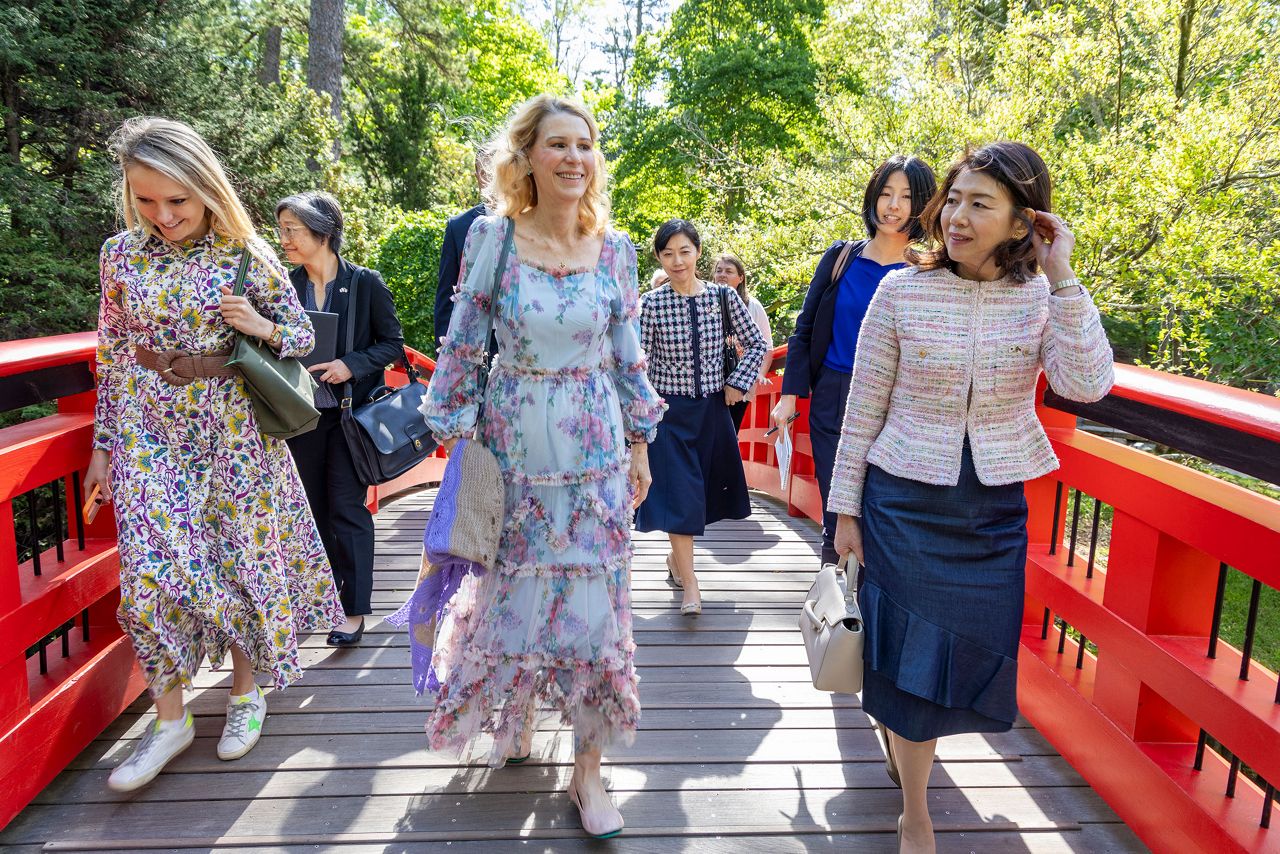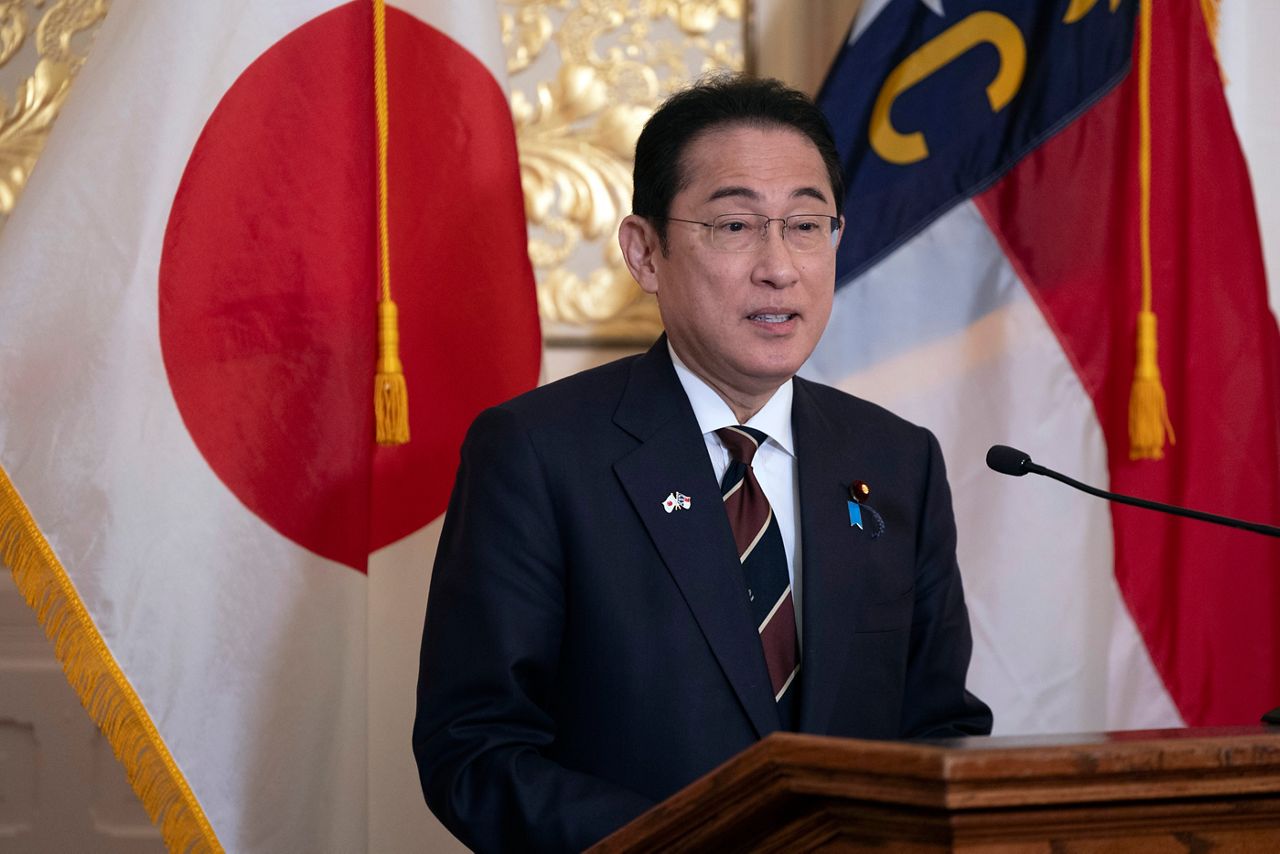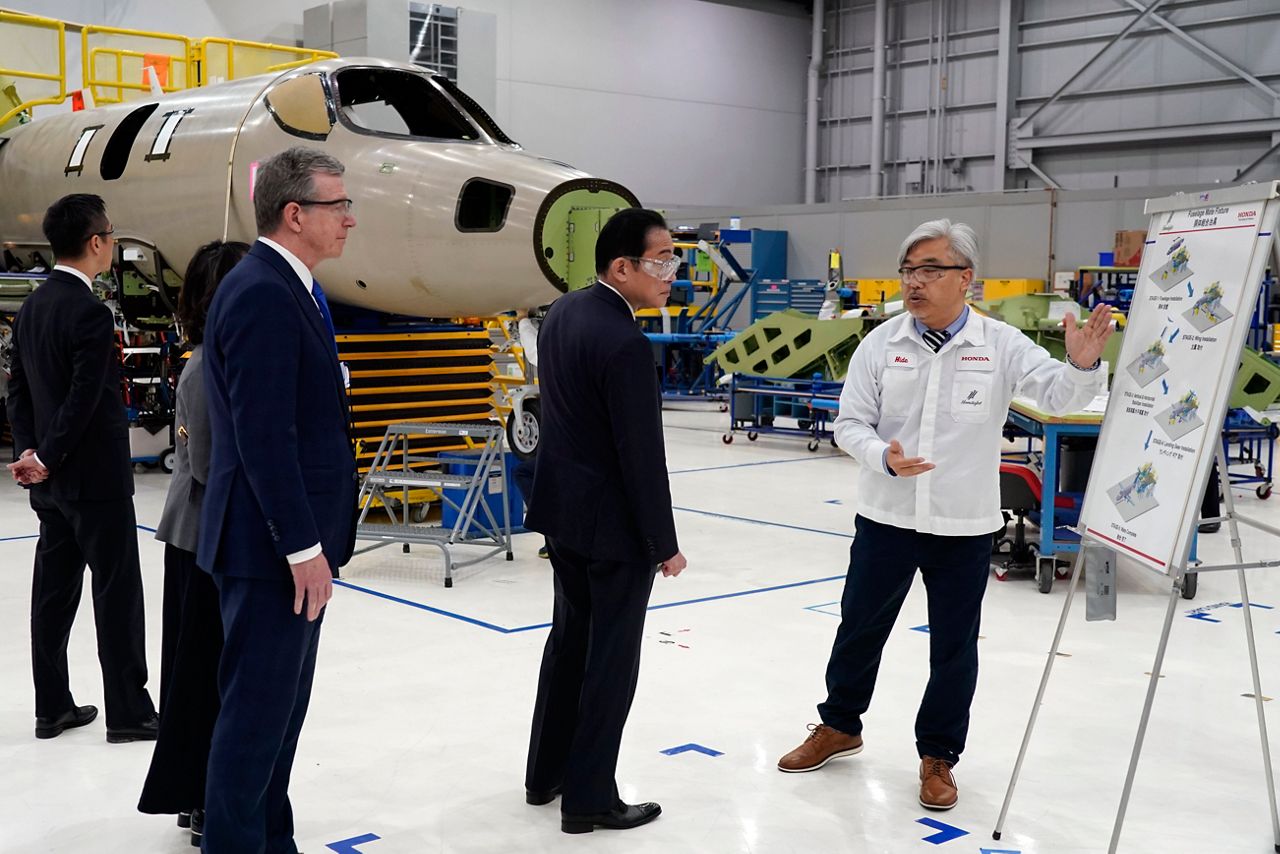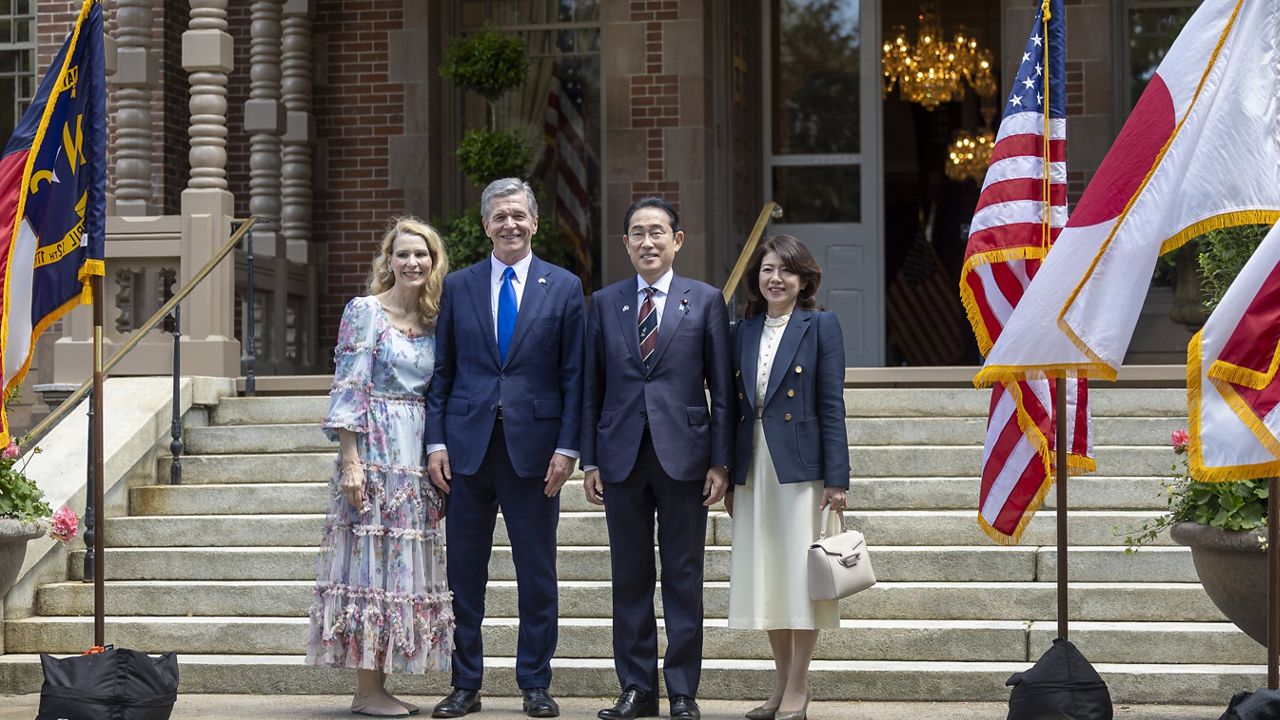Japanese Prime Minister Fumio Kishida and wife Yuko Kishida made history last week with their visit to the Governor’s mansion.
What You Need To Know
- Japanese Prime Minister Fumio Kishida and wife Yuko Kishida became the first head of a foreign country to visit the Governor's mansion last week
- Connections between North Carolina and Japan date back to the 1890s, when Japanese students were some of the first international students at N.C. State and UNC
- North Carolina has continued its cultural ties with Japan through things like the N.C. Japan Center and Japanese programs at schools throughout the state
- Economic ties persist as well, with Japan being North Carolina's largest source of foreign direct investment, according to the governor's office
It’s the first visit from the head of a foreign state to the Governor's mansion, but it also one event in the long-running and deep business and cultural connections between Japan and the Old North state.
A cultural connection 130 years in the making
The history of the relationship between North Carolina and Japan can be marked by three stories, those of two students and one doll.
The first story is of Teisaku Sugishita, the second international student to graduate from N.C. State, and is believed to be the first native of Japan to play college football in the U.S., according to the N.C. Japan Center.
Sugishita enrolled in the school’s civil engineering program in 1894 as part of the school’s fourth freshman class. It’s believed he may have been sent to the U.S. to study engineering as part of Japan’s efforts to industrialize.
"Between the 1860s and `80s, about 20 Japanese had been sent to the United States to study in various fields of engineering, with most of them returning to work in government positions, as did Mr. Sugishita, who worked for the Imperial Railway of Japan immediately upon returning," said John Baugh, former director of the North Carolina Japan Center and an N.C. State professor of civil engineering.
During his four years at the school, Sugishita played at most 12 games as quarterback for the school’s football team. He learned the game 40 years before it would become popular in Japan.
A second international student was also in the Triangle at the same time as Sugishita. Shinzaburo Mogi, from Tokyo, is believed to be UNC’s first international student, attending the school for the 1893-94 school year, according to the university.
Decades later, UNC sent books to the Hiroshima University library in 1951, after the atomic bombing of the city.
The third story that defines the history of the relationship between Japan and the Old North state is that of a doll, Miss Kagawa.
The doll was a gift from Japan in 1927, and is the longest serving ambassador between the state and nation, according to David Robinson, Honorary Consul for Japan in North Carolina.
After the attacks on Pearl Harbor, many of the other Japanese dolls on display in America were packed away, but Miss Kagawa was the only doll to be kept on display in the U.S., being displayed at the North Carolina Museum of Natural Sciences.
Miss Kagawa remained on display until 1998, when it was sent back to Japan for refurbishing. When it returned to Raleigh in 2000, there was a welcome home ceremony.

Yuko Kishida, the wife of Japanese Prime Minster Fumio Kishida, made a stop at the Museum of Natural Sciences last week to see the doll.
Kishida also stopped by the Culberson Asiatic Arboretum at Duke University for a traditional Japanese tea ceremony. The Japanese garden takes inspiration from Durham’s sister city, Toyama, Japan.
Modern cultural connections
One-hundred-thirty years after Japanese students first attended universities in North Carolina, cultural connections continue to be formed.
Animazement, an annual Japanese animation and culture convention, holds events like tea ceremonies, language and culture classes, and studies of Japan’s culture.
Robinson, who also serves as the chair of Japan America Society of North Carolina, said the event serves as a celebration of Japanese culture, and is a pipeline for people to further study Japanese language and culture at one of the many programs at North Carolina universities.
Schools across the state, including Western Carolina University, the University of North Carolina at Charlotte and the University of North Carolina at Wilmington, have Japanese programs.
UNC offers classes in Japanese language, literature and culture. Duke has a Japanese program that is built to teach students Japanese language and culture.
But out of all the schools in North Carolina, N.C. State might have the closest ties with Japan. The school is home to the N.C. Japan Center, established by Governor James Hunt in 1980 after a state trade mission to Tokyo.

Robinson said the center was founded to provide services for foreign direct investment, but is also committed to cultural and academic exchange.
The Japan Center played host to Prime Minster Kishida during last week’ s visit, the first visit by a foreign head of government to N.C. State’s campus since 1954.
N.C. State also has a long-running relationship with Japan’s Nagoya University. The Nagoya Global Campus was established at N.C. State last year, offering dual-degree programs, student exchanges, and global internships for students from both schools.
Many of those students will go on to work at a Japanese-owned company in North Carolina.
Over 30,000 North Carolinians go to work at Japanese companies every day, according to the North Carolina Department of Commerce. More than 225 Japanese-owned companies operate in North Carolina from about 500 locations, according to the department.
Those numbers are only expected to grow.
Japan and North Carolina: Economic partners
Kishida’s visit was marked by Fujifilm Diosynth Biotechnologies, a Japanese biopharmaceutical company, announcing they would bring nearly 700 new jobs to Holly Springs as part of a $1.2 billion expansion in its manufacturing plant.
“The new jobs created by the expansion of FUJIFILM Diosynth Biotechnologies in Wake County is yet another example of the thriving economic relationship between North Carolina and Japan, and we are grateful for their continuing investments in our state. Japanese companies continue to provide good-paying jobs and economic opportunity for people across North Carolina,” Governor Roy Cooper said in a press release.
The expansion brings Fujifilm’s total investment in the state to $3.2 billion, providing over 1,400 jobs. But that’s just a small part of Japan’s economic investments into the state.
Robinson said that most of the Japanese companies that have invested in North Carolina are still here, and that success encourages other Japanese companies to invest.
Over the last decade, there has been $17.5 billion in Japanese capital investment in the state, and more than 9,000 jobs have been announced, according to the Department of Commerce. Japan is also North Carolina's largest source of foreign direct investment, according to the governor's office.
Some of the largest Japanese companies in North Carolina include Honda Aircraft Company and Toyota, both of which Kishida visited with Governor Cooper last week.
Both companies have chosen North Carolina for some of their biggest expansions.
Honda Aircraft’s global headquarters is in Greensboro, where the company employs about 900 people. Last July, the HondaJet factory in Greensboro was chosen to develop and produce the HondaJet 2600, designed to be the world’s first light jet capable of nonstop transcontinental flight across the United States.
The expansion created nearly 300 new jobs through a $55.7 million investment, bringing the company’s total investment in the state to over $335 million.
State officials have emphasized the state’s workforce as a primary factor for expansion.
“Talent comes first when companies consider a business location,” said North Carolina Commerce Secretary Machelle Baker Sanders. “Locations that can offer a talented and well-trained workforce, tailored to the needs of a particular industry, succeed in today’s business environment. North Carolina’s 'First in Talent' strategic plan helps our state deliver the world-class workforce that makes us the best place to do business in the world.”
Robinson says that North Carolina has the business conditions, like a good workforce, that draw companies in, but the decades-old connection between North Carolina and Japan makes the state an easy choice for Japanese companies.
Toyota has also chosen North Carolina for innovative expansions. In 2021, the company chose Liberty, about 20 miles southeast of Greensboro, as the site for its first electric automotive plant globally. The company has invested more than $13.9 billion in the Randolph County site and plans to create more than 5,000 jobs.

Japanese expansion in North Carolina has been supported by grants from the state. Fujifilm’s most recent expansion came with $18 million in incentives, and their 2021 expansion was supported by a nearly $20-million grant.
HondaJet’s expansion was supported by grant that could send the company up to $3.4 million over the next 12 years.
Toyota’s choice of North Carolina for its battery plant and subsequent expansions came after multiple meetings between the company’s executives and Governor Roy Cooper.
In 2023, Cooper traveled to Tokyo for the second time to attend the Southeast U.S./Japan Association Meeting. There, he met with Toyota and Bridgestone executives, another Japanese company that employs thousands of North Carolinians, according to the Governor’s office.
“Over thousands of miles of land and sea and several generations, North Carolina’s relationship with Japan has grown strong and resolute, producing valuable successes for our people. We look forward to continuing to work together to bring success to both the southeastern United States and Japan through this valuable partnership,” Governor Cooper said in a press release after the conference.
The 2024 SEUS/Japan Conference will come to Charlotte, North Carolina.



